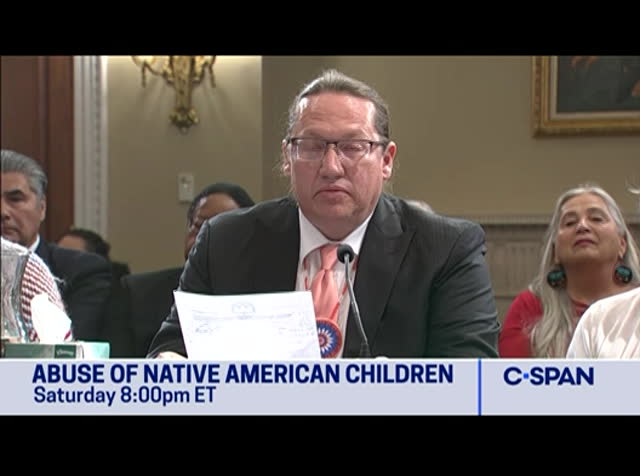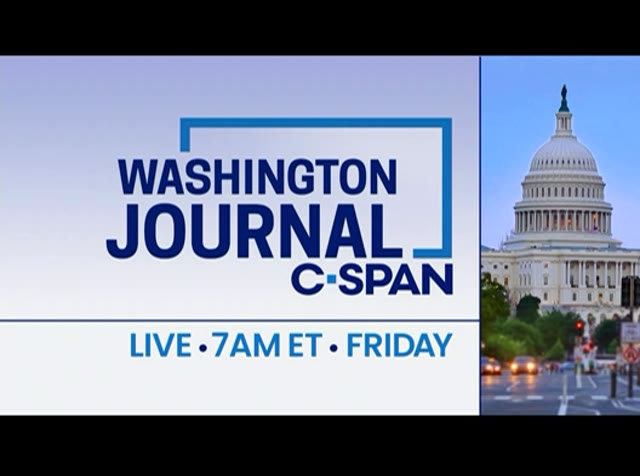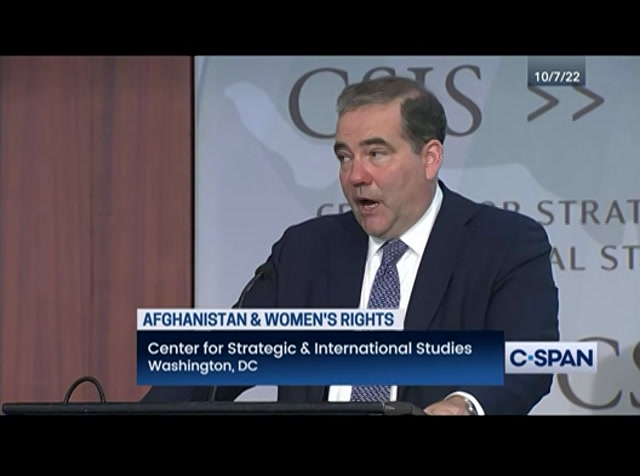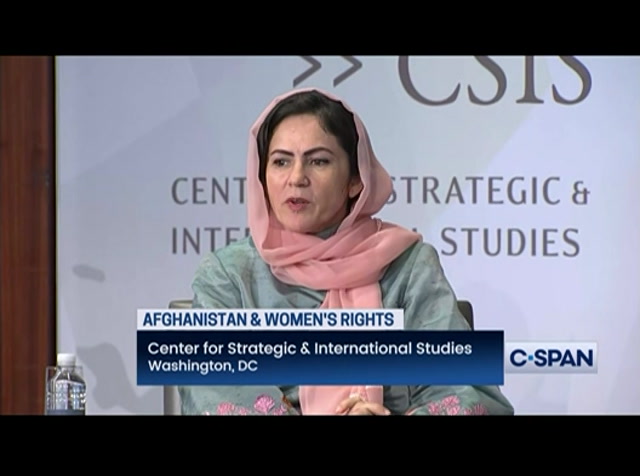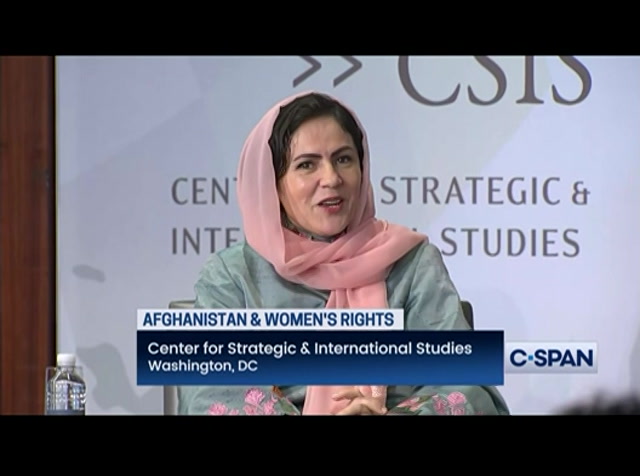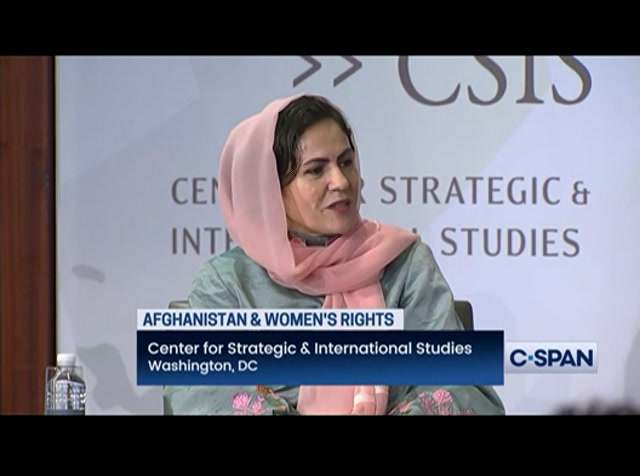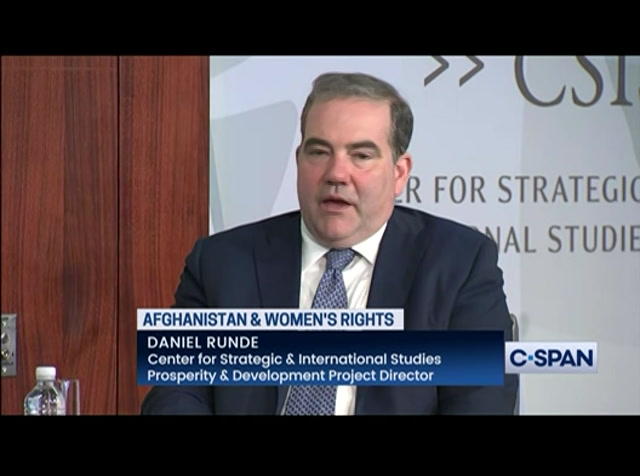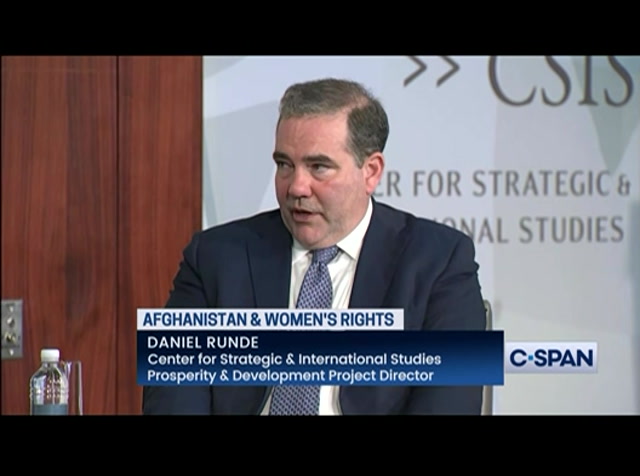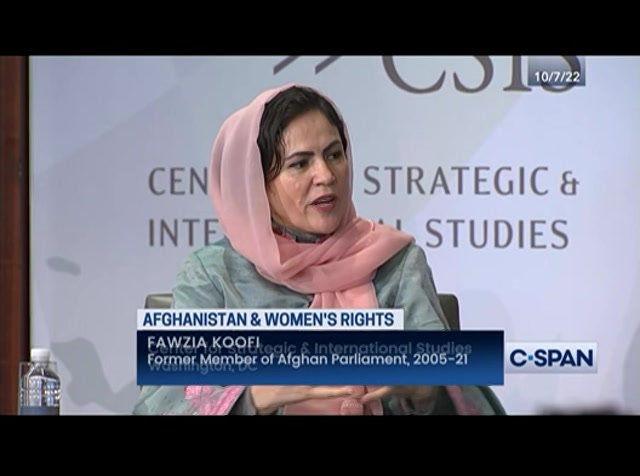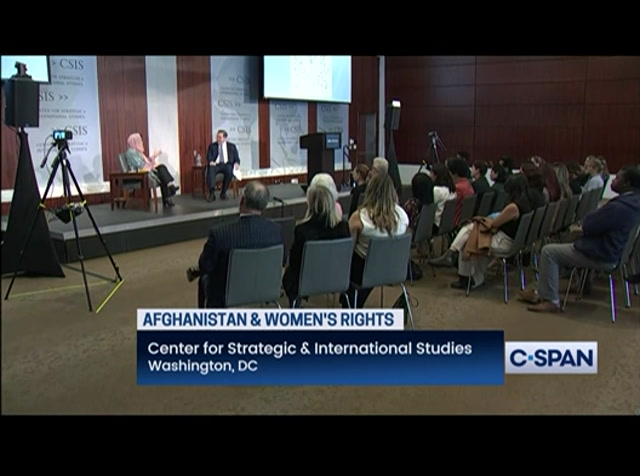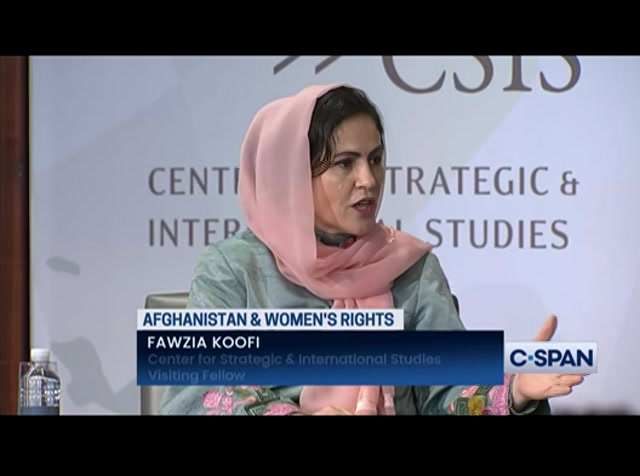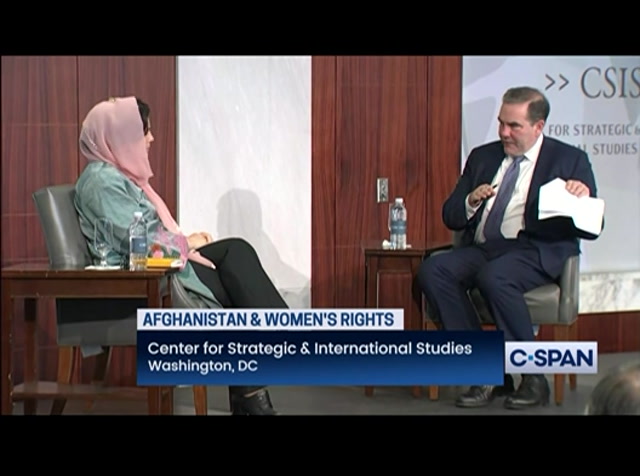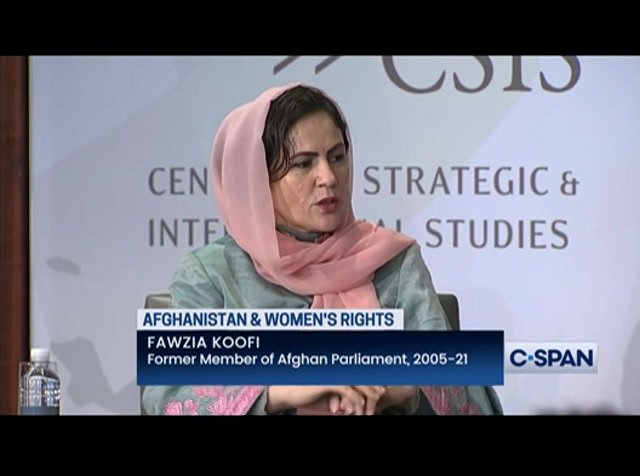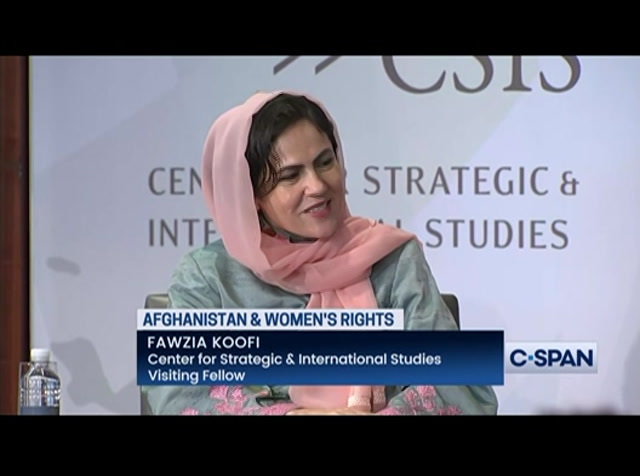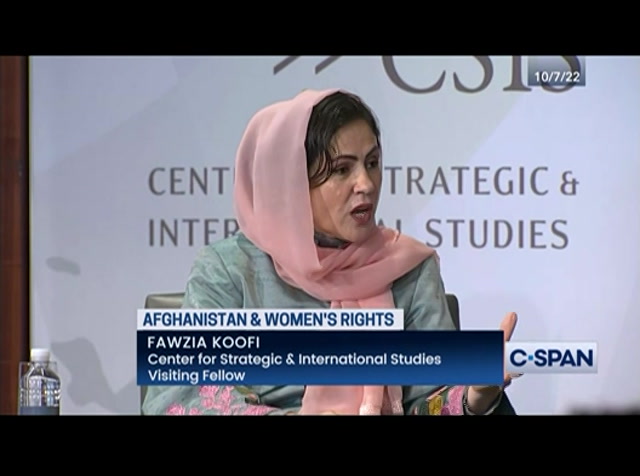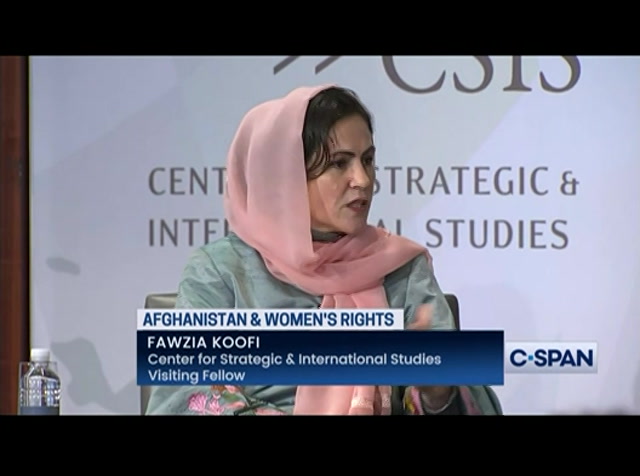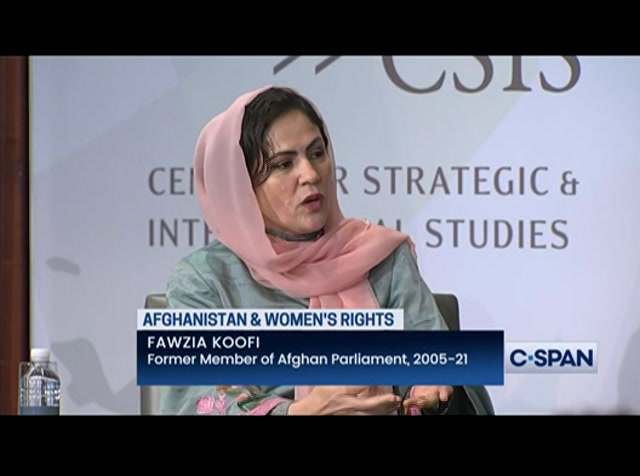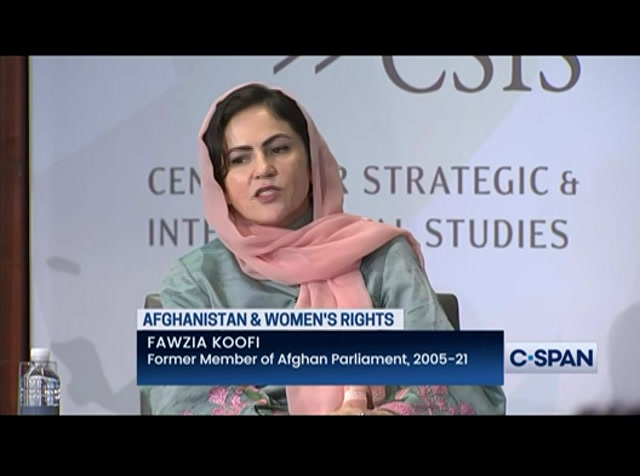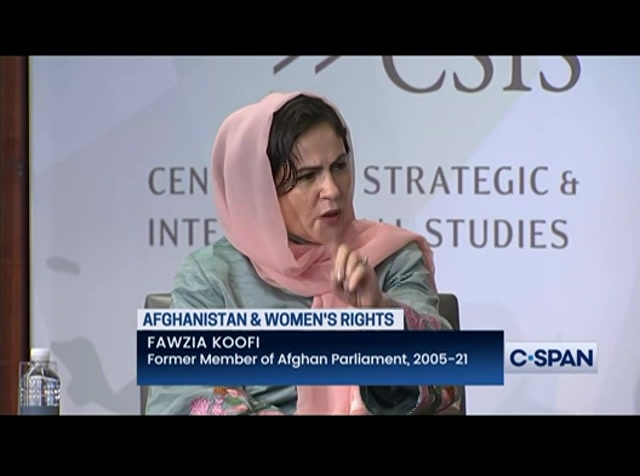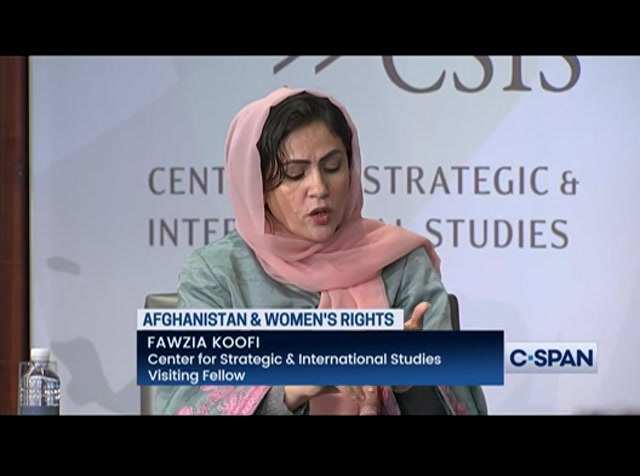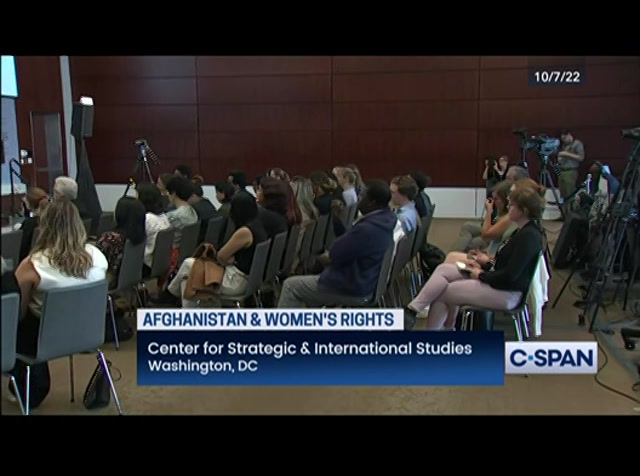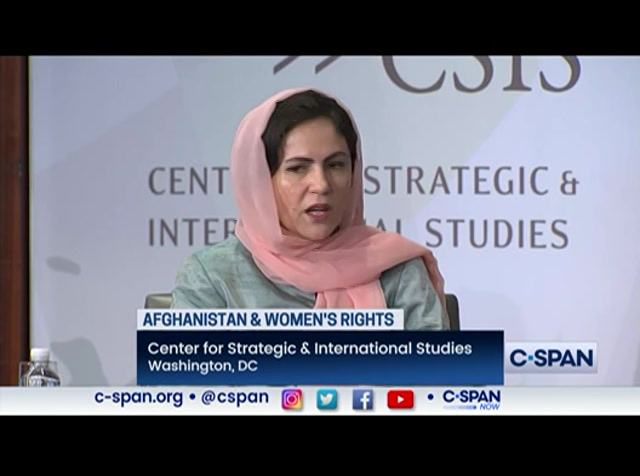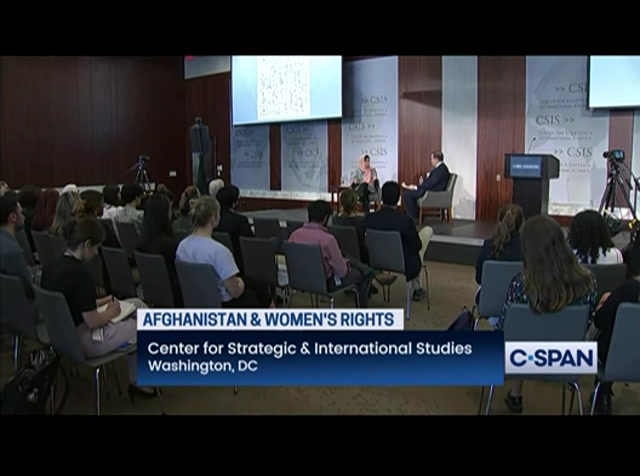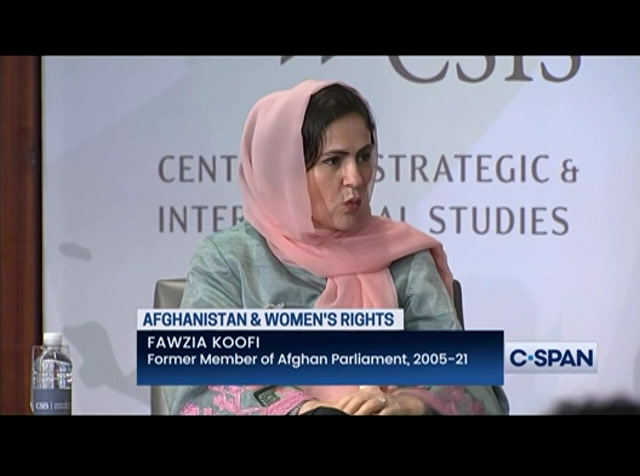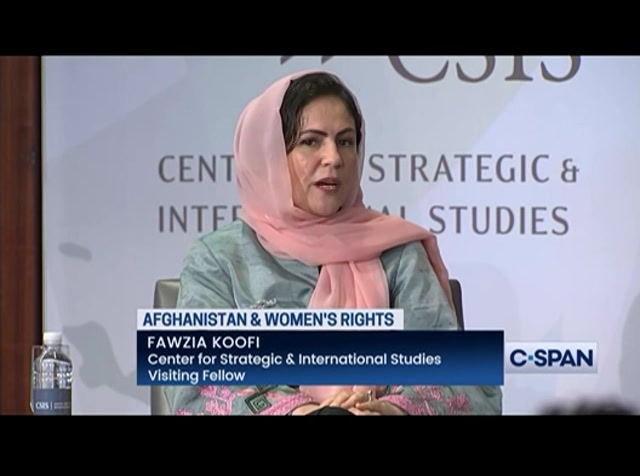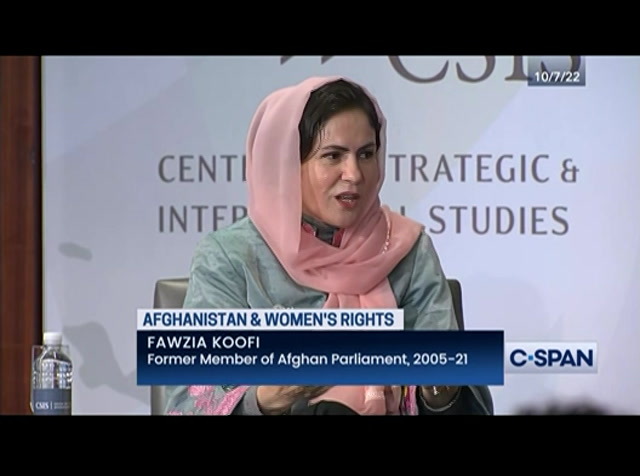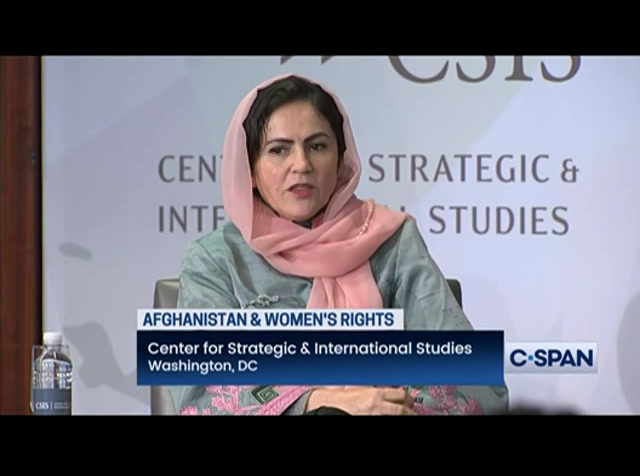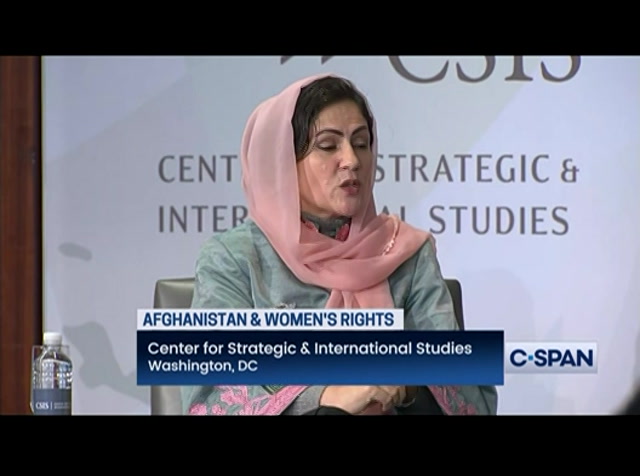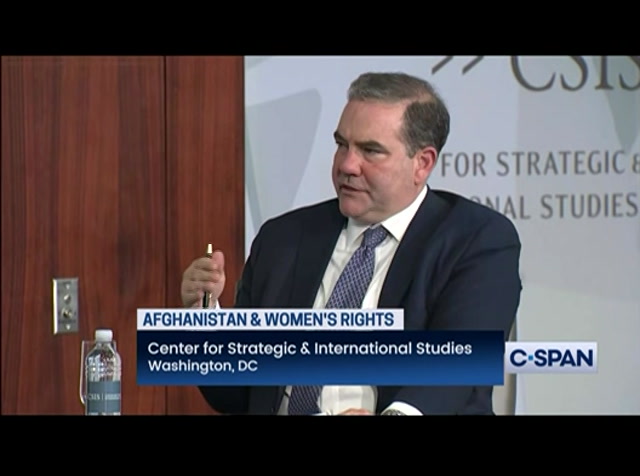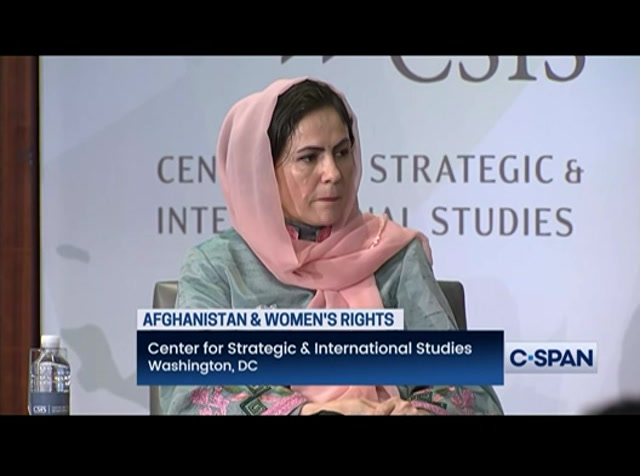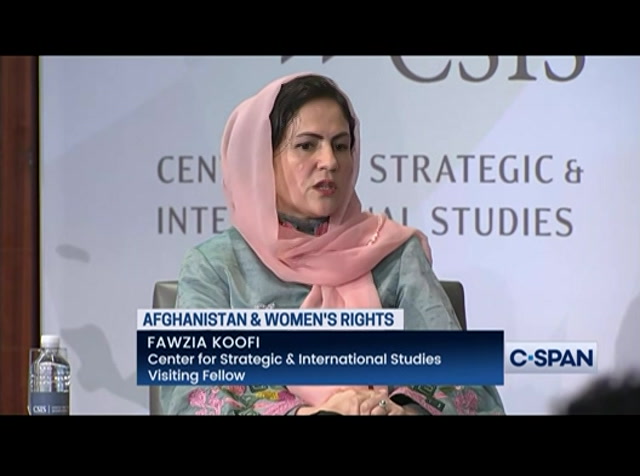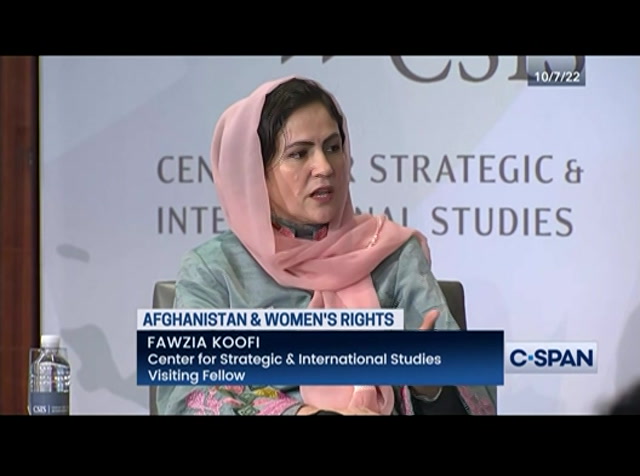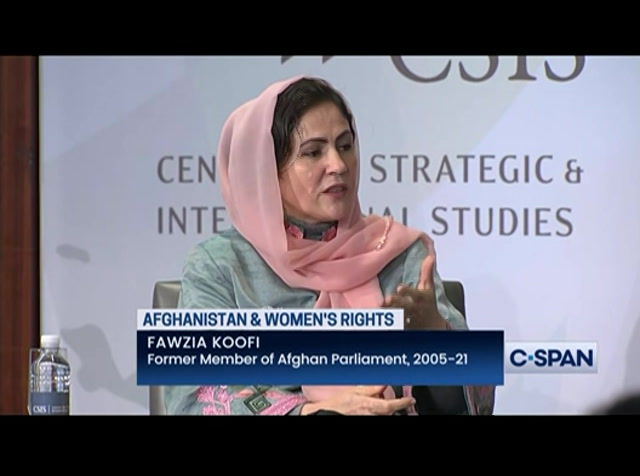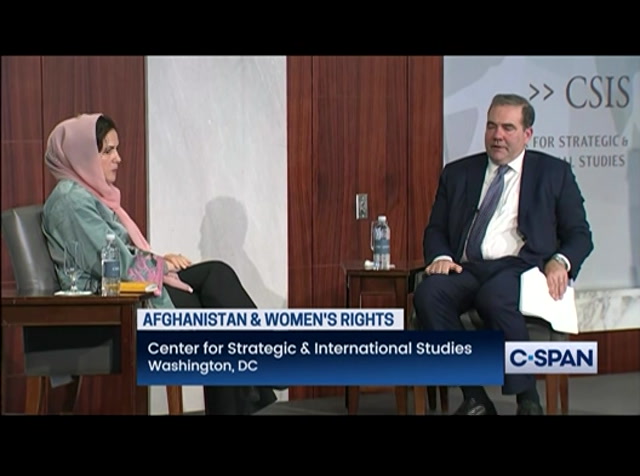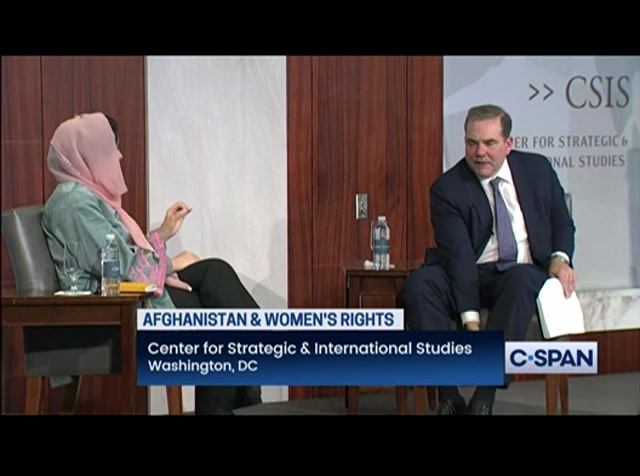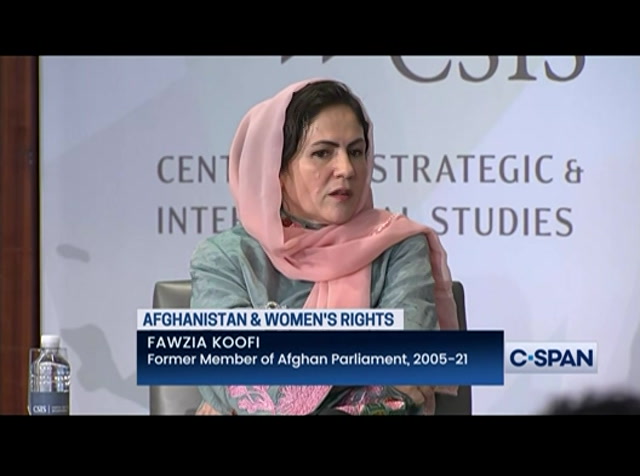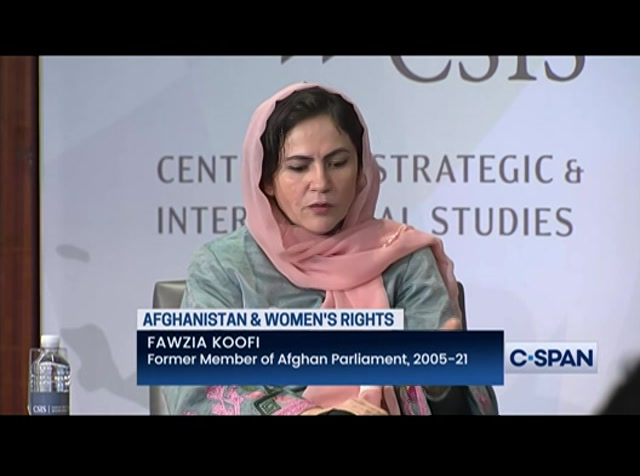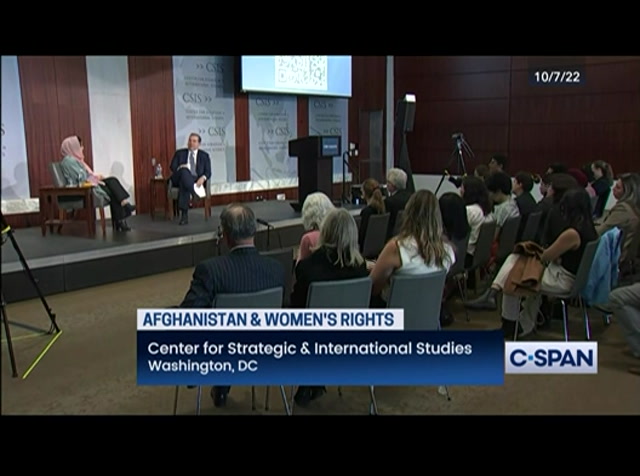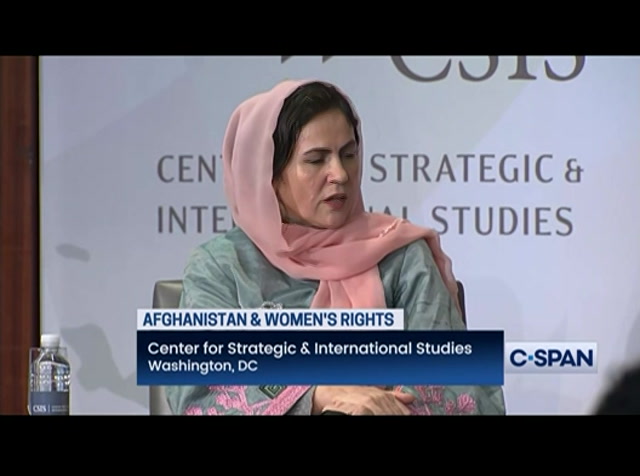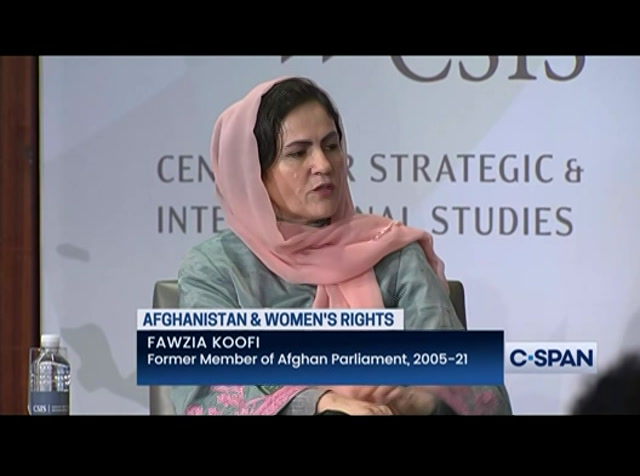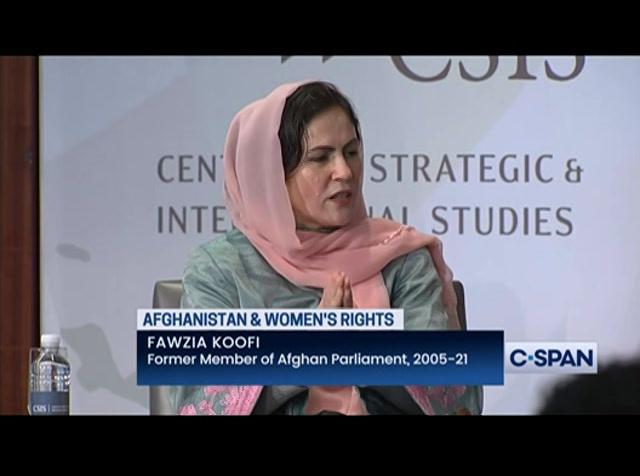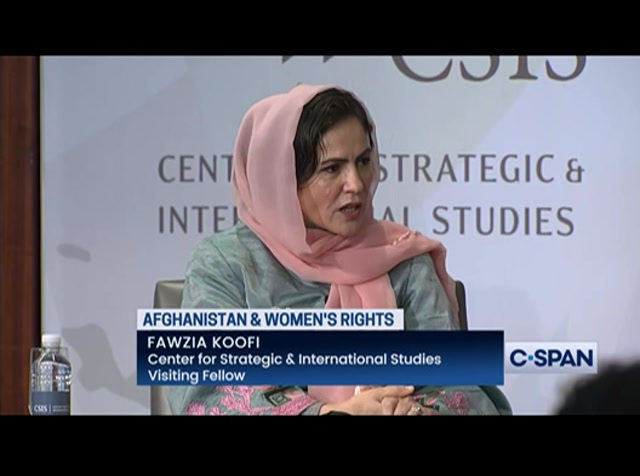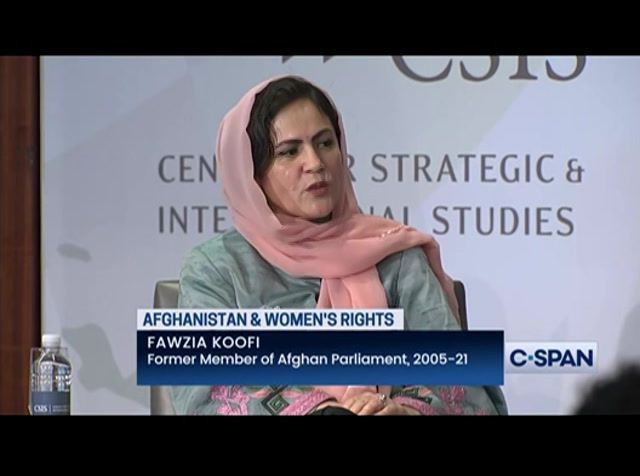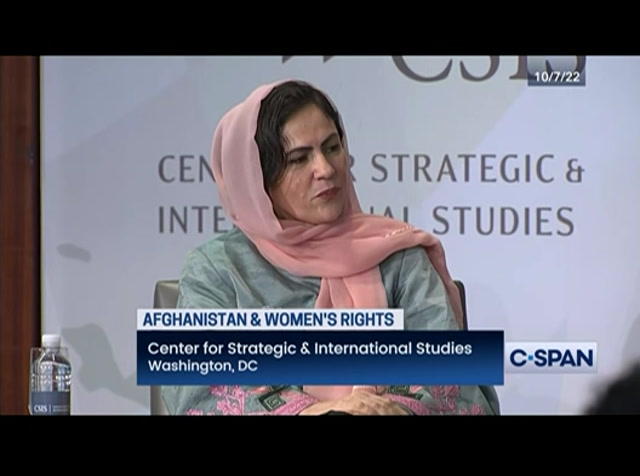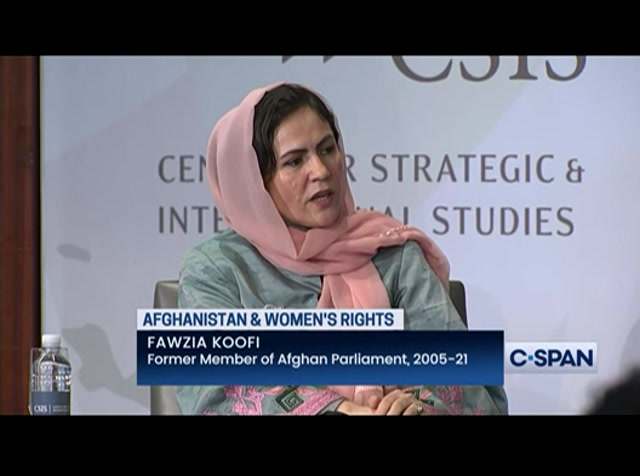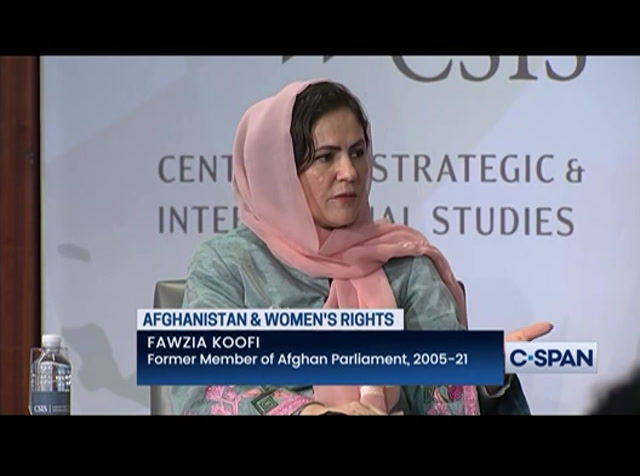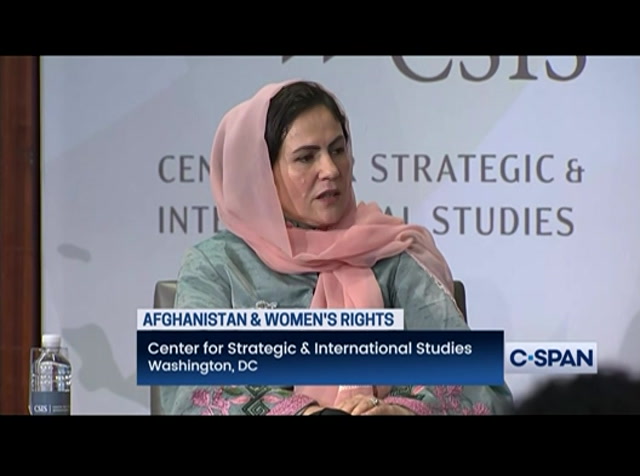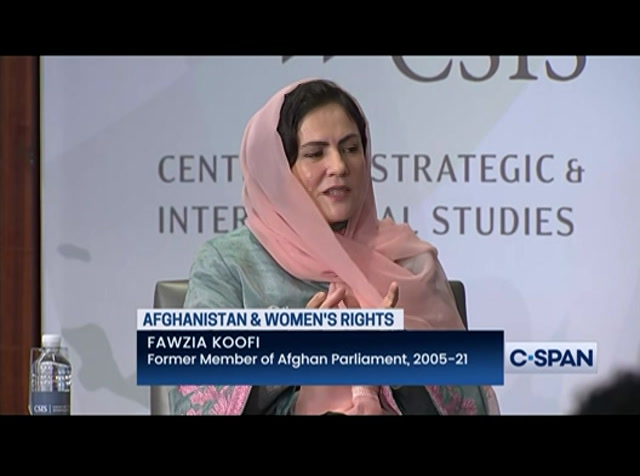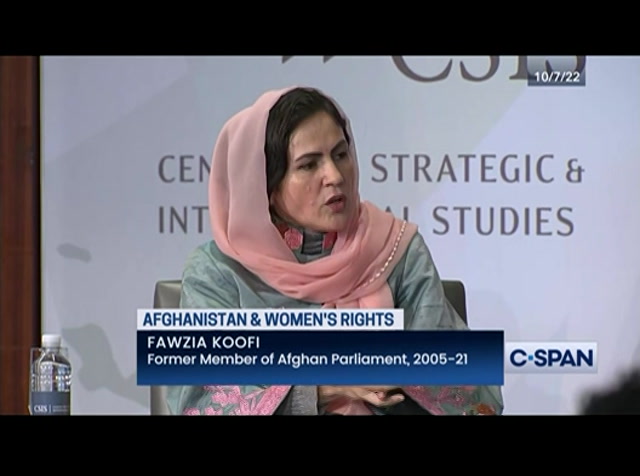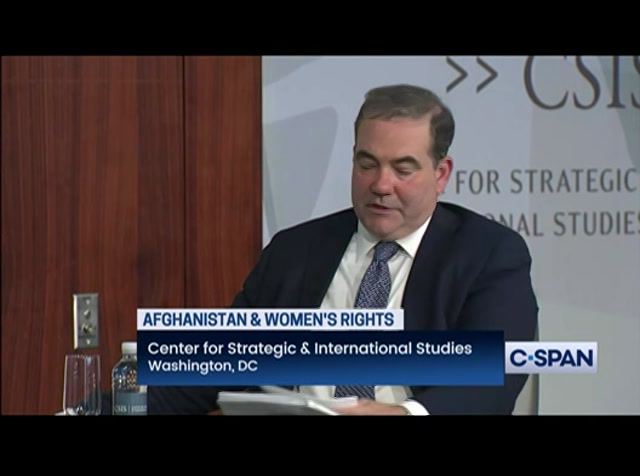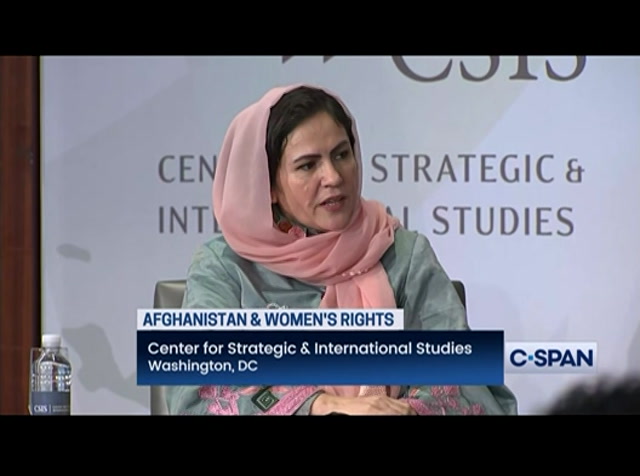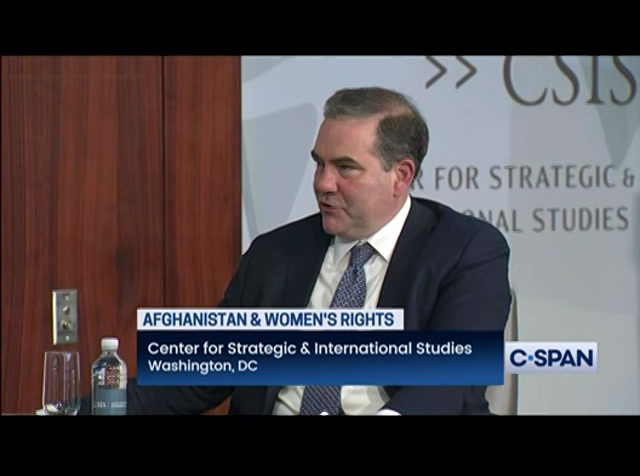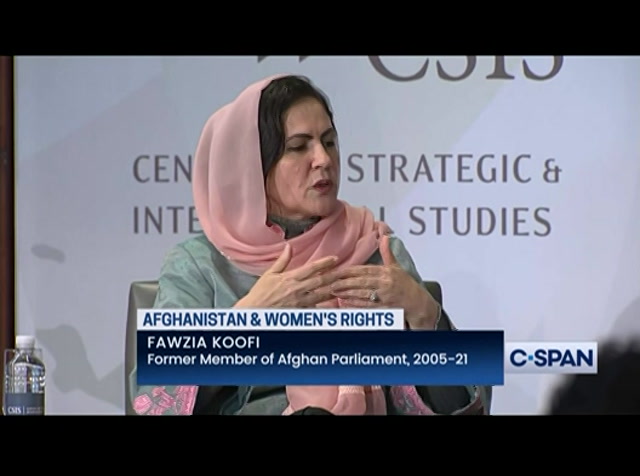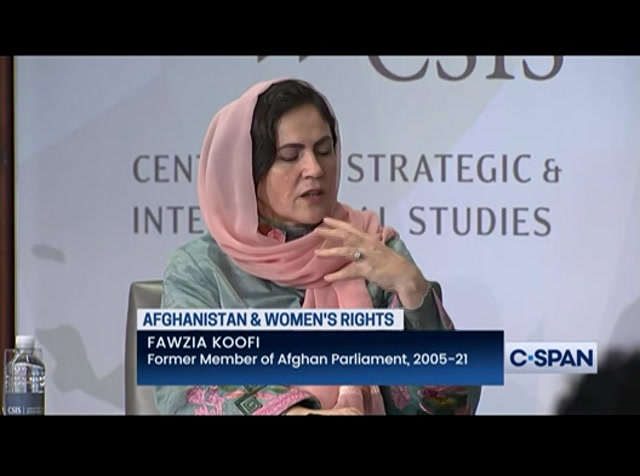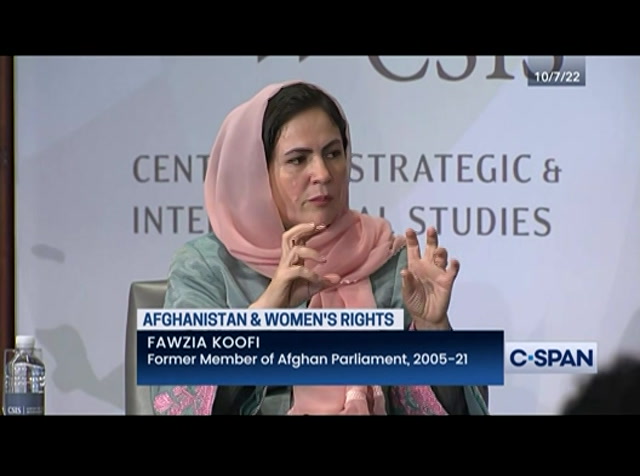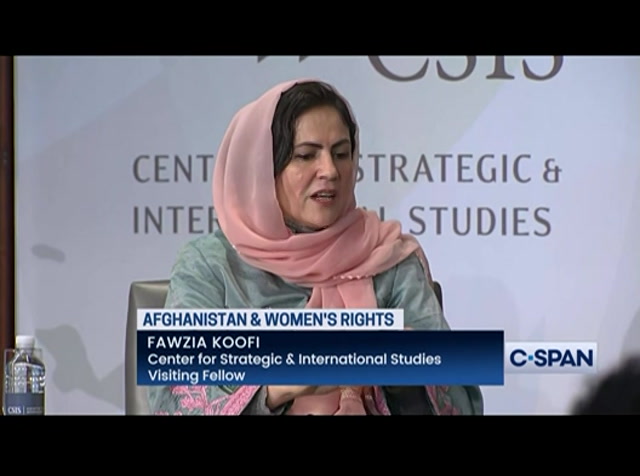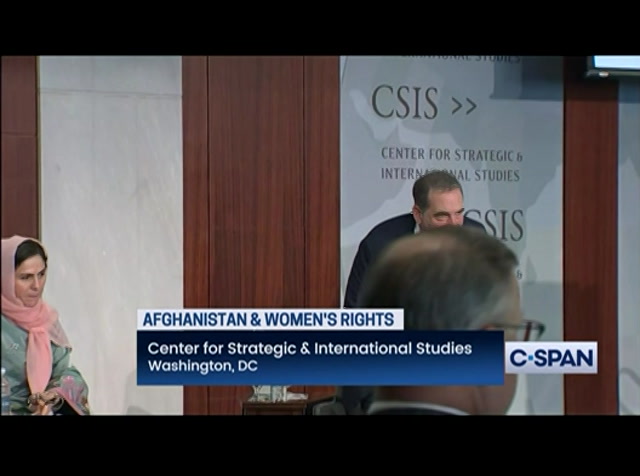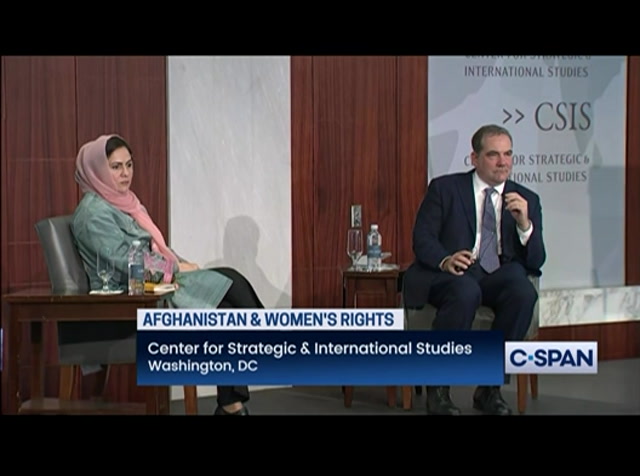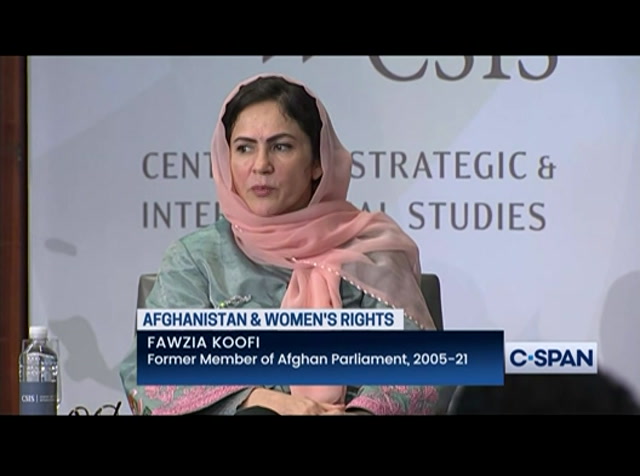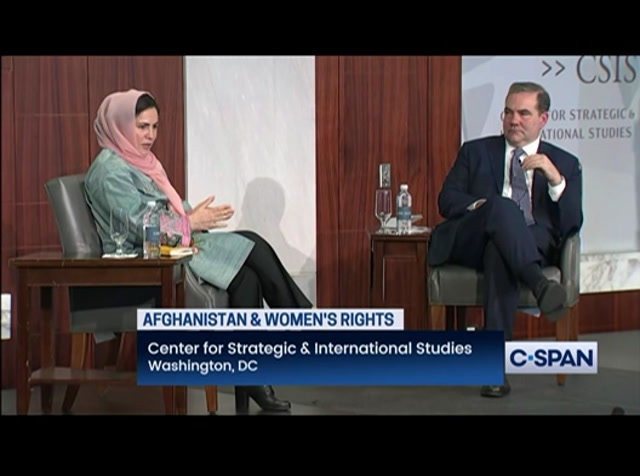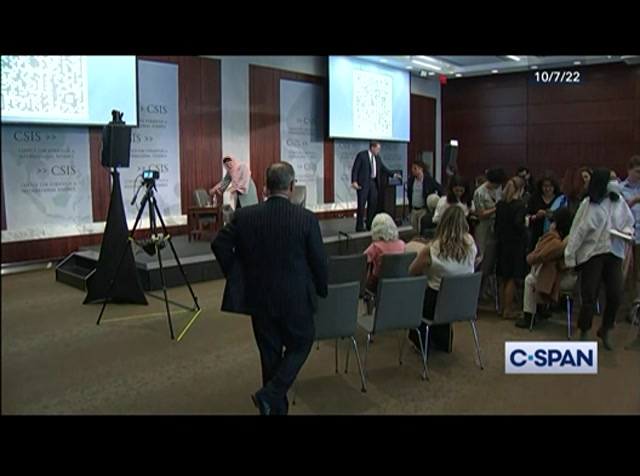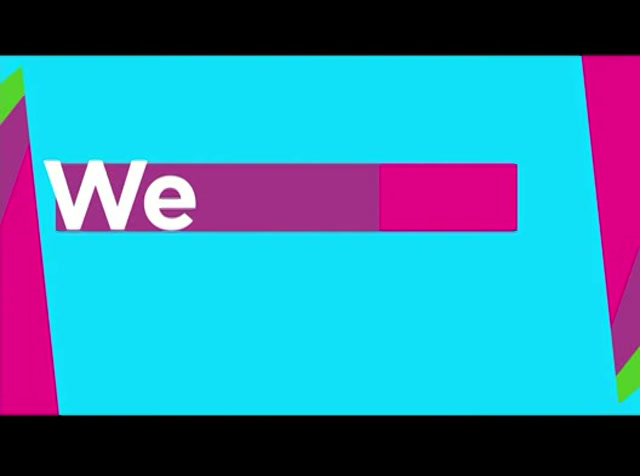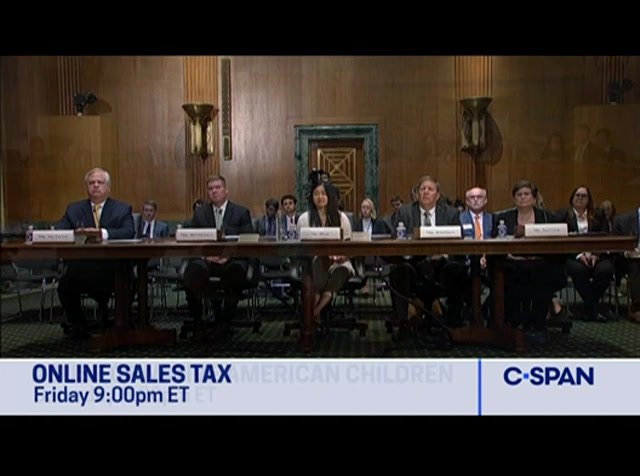tv Former Afghan Lawmaker on Womens Rights in Afghanistan CSPAN November 24, 2022 4:54pm-5:58pm EST
4:54 pm
supreme court justice samuel alito shares his feelings of shock and betrayal after the leak of the draft opinion he authored to overturn roe v. wade. then a hearing on the challenges collecting sales taxes for out-of-state purchases before the senate finance committee and on saturday, native american survivors of abuse at federal indian boarding schools testifying at a house hearing. the abuse happened at most of the 408 boarding schools run by the united states. watch this thanksgiving weekend in prime time on c-span or online at c-span.org. quick c-span's washington journal, every day we take your calls live on the air on the news of the day and we discussed policy issues that impact you.
4:55 pm
melissa reppo discusses consumer confidence and the u.s. economy. and then desmond lachman of the american enterprise institute talks about the u.s. economic outlook and potential policy shifts in the new congress. watch washington journal live at 7:00 p.m. eastern friday morning at c-span or she spend now, free mobile app. join the discussion with your phone calls, facebook comments, textbooks and tweets. >> the first woman to be elected to second deputy speaker in the afghan parliament talked about women's rights since the pet -- since the taliban takeover. >> i am really pleased to be hosting my friend.
4:56 pm
4:57 pm
this is after the fall of the legitimate government in afghanistan. i am really happy to have her here today. i am not going to say much more than that. i am going to turn it over. i will let you make some remarks. >> for afghan women to get a state with elevate attention shifted from afghanistan to another situation -- and when i was in euro, i was contacting my afghan fans in the united states and asking them to meet the members of congress.
4:58 pm
there was not a lot of interest for many of americans. it is not an area where a lot of americans want to keep their eye. i cannot believe it. how could you turn a blind eye to afghanistan? the women especially. now i can see that the u.s. has other priorities now. afghanistan is no longer a priority. that is heartbreaking because the consequences of that was not only on the afghans but yourself.
4:59 pm
you lost more than 3500 lives. afghans lost millions of lives. my worry is the situation -- if they don't keep their attention, i am not saying that -- when i am saying is that whatever is happening in afghanistan is shaping itself toward the future. thank you for having me here. there is a lot of anger and shame and confusion in the united states about what happened with afghanistan. way, and hope may be that we may not be interested in afghanistan, but events in
5:00 pm
afghanistan may become interested in us and we cannot necessarily build a wall high enough to protect ourselves from those dangers. we have to remain engaged. we hosted the special representative for afghanistan last week that talked about all the ways the u.s. remains involved. we did a paper here several years ago that said exactly what you are saying, fawzia, that after we leave we may be forced back to reengage in afghanistan when we do not really want to. i agree with you. we have an ongoing variety of interests in afghanistan. some because we were there. there is also a security interest and other interests as well. i want to get to some. one interest i think we have is we made major investments in supporting women leaders and investing in women and girls in afghanistan.
5:01 pm
several million girls went through kindergarten through 12th grade. what i said all along is that that investment will radically change afghanistan. look at a country like bangladesh, other thousand asian countries. investments in women and girls have totally positively transformed bangladesh. you could argue there is a direct correlation between investments in women and girls, the number of education of girls in bangladesh, to the positive economic outcomes in bangladesh. right now under the taliban, girls cannot go to school after what, ninth grade, eighth grade? fawzia: sixth grade. daniel: it is barbaric, ridiculous, outrageous. how do we get girls back in school? fawzia: girls not being in school is one of hundreds of challenges that afghanistan faces today. the fact that girls do not go to
5:02 pm
school explains the ecosystem where women are living in afghanistan. women do not go to school. ultimately, they do not go to work. they will not get to go to university next year. this year, the taliban banned many girls from going to university or taking the university entrance exam. they cannot get into journalism. they cannot get into a law faculty or an engineering faculty. these are not regarded as a job that is traditionally for women. we talk about girls education, because from my own personal experience, i can see a lot of younger afghan girls here that were stopped from entering primary school or university by the taliban.
5:03 pm
it took me 20 years to catch up. the time that i was not allowed to go to university, five years. i wanted to come a doctor, but they stopped me along with many other girls, and women in afghanistan. it took me years to be what i wanted to be. i was working on my own when this happened. the u.n. report also says that the fact women are not going to work impacted afghanistan's economy by a huge percentage. $5 billion for the fact they are not allowing women to go to work. this is a country putting millions at risk of severe poverty. why are we depriving women? it is not even a social or political issue. it is a matter of security. if any government is oppressing
5:04 pm
55% of its society, women and girls, depriving them of basic rights, that can pave the way for other extremism. now, the ground is paved for military extremists to come back. they came to power, their priority is oppressive measures against women, basically. anti-women's rights. minimizing women's rights. as f, a woman's freedom and -- as is, women's freedom and liberty is the only problem in afghanistan and if you can find women to their homes, afghanistan will become a prosperous garden in the future. that's not true. women were already suffering. you can imagine the amount of frustration in afghanistan, not
5:05 pm
just from women, but everyone living there. daniel: you lived under the taliban and your husband was killed because of his treatment by the taliban. what was it like living under the taliban? how did you get educated? what happened? fawzia: i was born in a very traditional family, though my father was a member of parliament. he never allowed his own daughters to go to school. i was the first to go to school because my mother helped me. they say that if a woman is educated, she will educate her society. that is why girls education is key in afghanistan. eventually, because of what i had gone through as a woman, experiences in my life, facing discrimination, facing injustice, i could see women around me, and also men around me, suffering from exclusionary politics, mainly by the taliban. i could see women whipped in the streets for not wearing the
5:06 pm
appropriate clothes of the taliban. i was thinking, something is wrong here. because, there is a social contract between people and the government and there should be mutual accountability. the taliban was not committed to that at all. more about committing to that now. that drew me to politics. the september 11 attacks and the u.s. commitment that they will help people of afghanistan achieve democracy, which eventually they failed, i went into politics. for me, politics was a means of change. therefore, when i was elected, and i think anybody, when you are elected into office, that is the first step. for you to achieve what you want to achieve, your dreams, for your country, your people. getting into office was not my objective. it was a means to do what i wanted to do. it was not an easy path. we were not allowed to speak
5:07 pm
what we wanted to speak in parliament. the microphones were tapped. this is 2005, 2006. this was the first democratic parliament after 40 years of war. it was not an easy experience. we really had to pave the way. we stood for protecting what we wanted. women were in the forefront of all of that, talking in front of parliament, to society. when i traveled to rural villages in afghanistan, people were following closely and so aware, thanks to the media, of what was happening. women were asking me in the villages. do you know who will be the u.s. president next time? hillary clinton or barack obama. that is indicated of how women were aware of what was happening in the world and they wanted to
5:08 pm
be part of the progress. for me, politics was a beginning to change and transform the society. every woman and man who worked in afghanistan the last 20 years, whether in politics, they were part of the transportation -- transformation. afghanistan is a transformed afghanistan, not the afghanistan that the taliban took over in 1986. now you see that when, for instance, last week, and active -- an act of genocide, basically, not only women, but men, protesting in the streets. but women were of course, leading these protests asking for a better afghanistan. i think they deserve for us to stand with them.
5:09 pm
in afghanistan, everyone has a gun. everybody believes in the use of violence against women, especially the taliban. oppressing the people, they were using guns and violence against these women. that is a scene we cultivated the last 20 years. it is now growing. my place in the world is before we die, let's continue to help them achieve what we want. we do not want the women of afghanistan to look like the women of the u.s. and europe. we want basic fundamental rights. the right to go to school, to go to work. to be able to have a say in the future of your country and live in a society that is equal. daniel: do the u.s. and other
5:10 pm
countries have leverage in this situation? if so, what? the u.s. and europe's leverage is getting smaller day by day. the taliban has learned how to maneuver politics. countries offered the taliban and embassy. they accepted a taliban diplomat. china, with afghanistan, they have a lot of economic interests. central asian countries have interest in afghanistan. so for the u.s. and for europe, these are issues. that could minimize their leverage. before it is too late, i am saying again, you all have leverage. your leverage is the people of afghanistan that believe in a different afghanistan. the women of afghanistan that could be her partners.
5:11 pm
-- your partners. victims and survivors, regard them as your partners. i do not like the sympathy when we share our problems. we are sorry for you. ask beyond being sorry. ask in solidarity with people of afghanistan. in 2015 the taliban was nowhere. in 20 years, it was not able to can troll one district. only -- to control one district. only in 2021, it is a different story, that they managed to control our area. for 20 years, they were not able to control even one district in afghanistan, right? they were nowhere. afghanistan was the only country in the world.
5:12 pm
the women of afghanistan, the transformed part of afghanistan, you guys invested blood and treasure. use your money. there is this tendency that the people of afghanistan are hungry and we need to help them and give them money. that is good. thank you for that. but look beyond the humanitarian issue. look at the political situation. we need to use political leverage against the taliban. it was either fight or friendship. there is no middle ground. i hope that the u.s. -- some diplomats are asking for travel ban removal for the taliban to be able to travel to some of the
5:13 pm
countries. but ask somebody that holden afghanistan passport, when i came to the u.s., i was picked for a suture -- a security search. i want the taliban to undergo the same security search. the sanction in the united nations. can we bring some of those measures? >> so you would ask for everybody that comes from the taliban to go through a dhs search? that is a horrible process. i am sorry you had to go through that. there are a number of things that have been announced. secretary blinken recently announced the alliance for afghan women's economic resilience. i think that is linked to how we can figure out a way to economically and politically construct a representative process for afghanistan, for
5:14 pm
voices inside and outside of afghanistan. can you talk about secretary blinken's alliance for afghan women's economic resilience? what will it take to have a representative process for voices in afghanistan to be more heard? fawzia: on the initiative, there are two initiatives. any initiative, we welcome it. i wish the initiatives were undertaken before the collapse. before the collapse, women were forgotten. in my conversation with u.s. diplomats, when we were asking why there was no mention of human rights and women's rights, the answer we got was, like, our soldiers are not here to shut budget to protect women in -- shed blood to protect women in afghanistan. it makes sense. human rights has never been a
5:15 pm
strategic issue and i understand that. but, the women of afghanistan today, we put them at risk. this is clear. moving forward, these initiatives must focus inside afghanistan on women organizations led by women. a lot of women lost their jobs. their husbands, brothers, were killed in the war. you are a joint effort to protect our values. they were killed and now they are left with no support. and the taliban asked them to leave their jobs because public jobs are not for these women, only for the taliban, by the taliban. these initiatives are important. but, i think that one has to really see the horror of the situation. the holes that whole ecosystem of afghanistan -- the whole ecosystem of afghanistan. using your leverage for a
5:16 pm
political sentiment in which time the ground is prepared. taliban is provided. you can use all of these -- the taliban is divided. you can use these opportunities. daniel: talk about the taliban being divided. we read about this. i asked special representative webb about this and he did not want to talk publicly. but i want you to talk publicly. how is the taliban split? fawzia: they are. women groups -- fighting in the mountains was the easiest for the taliban because they are a group of fighters but once they'd came to power there were disagreements over power, who was controlling more resources, who was controlling security situations, who is more extreme in their views. so they are split. one branch, some of them were in doha and a political office. -- in political office.
5:17 pm
their leader seems to be more traditional. i am not sure if he is educated or not. daniel: have you met him? fawzia: no, luckily. nobody has seen his face. we don't really know if he exists as a human. we just know his name. so he is in cut a hard surrounded by a group of traditional people who do not believe in girls education. they believe this is against our tradition, against our religion. some of the very conservative provinces have different provisions about again -- against girls not being in school. they are claiming an afghanistan 200 years back that we do not remember. then you have another group that fashions themselves as progressives but i do not think they mean it. they just want to have a good relationship with the world.
5:18 pm
they want to say with the world wants to hear. these are our leverage points over the taliban. daniel: you were part of the doha process. the question i asked last week is, did the taliban lie during that process, to us, do you? fawzia: we, as the international community, and people in afghanistan, seem to believe that. daniel: we wanted to believe it. fawzia: we wanted to believe it and now we are trapped in the narrative that they are taliban 2.0. that they change. they say this and have been public about this. it is safe to say that one of the taliban one of the 11 people who signed the verdict on jobs, he is the minister now in the cabinet of the taliban. he in one of the dialogues said
5:19 pm
that from our perspective in the taliban a woman can be minister, foreign minister, prime minister. daniel: but then he signed assange saying fawzia: he is one of the ministers that signed this. he has a good relationship with china. daniel: you are saying during the doha process before they took over he was saying all sorts of progressive things, then turned around and signed a statement --. fawzia: a statement that put woman in a situation where they all have to cover their faces. the taliban hijab, which is not even islamic because there is no agreement about what is hijab in islam. the burqa is traditional, but only in remote areas. why would a government enforce
5:20 pm
this specific idiom over all the population? that does not work in the 21st century. people listen without using their leverage to help us. anyway. he signed the verdict along with 11 people. my request at the yuan security council last week was simple. -- un security council last week was simple. they ask the male member of the family is a woman goes out of the home without the h ijab, the man will be punished. so my view is simple. they should not have the ability to travel. daniel: do you see any
5:21 pm
alternative to the taliban emerging. fawzia: there are many. the first alternative is the women of afghanistan. now, the women of afghanistan are the most organized natural resistance force against the taliban. if they don't speak, do not protest in the streets, that does not mean we are happy. we are receiving calls and messages from women across afghanistan from a from the south to the east, and everybody is asking for a life with dignity. these are woman. there is a man that started a campaign to let girls go to school and a lot of women are joining. women in that province cannot go to school.
5:22 pm
support them the same way you supported taliban -- the taliban in qatar, set up an office for them in qatar. we are not happy about the political community of afghanistan. the level that the taliban managed to leverage that and come to power. but there is a new, empowered generation and others that have made difficult choices of fighting the taliban independently. we do not disown them. we -- they had a choice. a lot of the department of security forces joined either isis or military resistance on different platforms against the taliban. women, the people of afghanistan, or the alternative. give them the same platform you give to the taliban and see the afghanistan they manage. daniel: you and i often talk
5:23 pm
about the role of religious leaders. this is a very religious society. i think we in the west, at least among elites, it is largely a post-religious belief. we would rather talk about anything other than religion. it is something we get very uncomfortable talking about, even in a country like the u.s. that was essentially founded by religious dissidents. it is an uncomfortable topic at times. when i went to afghanistan in 2019 i asked to meet with people that were not supporters of the democratically elected government. i met with a religious leader, a prominent one. i said, could you imagine a prime minister of afghanistan being a woman someday? he said no, that is not islamic. i said, anglo --, pakistan, indonesia, all islamic societies
5:24 pm
that have had women prime ministers. tell me why is that? he ignored me. could you talk about the issue of how we engage religious leaders? as you said, there is a sector of views within islam on this. i think there would be a lot there. talk a little bit about that. fawzia: i think that the muslim society, islamic countries, and other countries, they have a huge responsibility to counter the taliban narrative. the taliban narrative is not islamic and it will create islamophobia if they continue to oppress the nation under the name of islam. a lot of military extremist groups were founded in the 21st century in different countries. the narrative they try to find
5:25 pm
for themselves is, oppress women. look at military extremist groups that took power by military means. it is an easy entry point to oppress women. then, gain popularity. if you ask, what is your financial policy, your economic policy, your social policy? if you ask of the taliban, they don't have answers for any of those things. oit member states, there silence is frustrating the people of afghanistan. they recently sent a delegation of 10 people to afghanistan. the taliban is clear that there islam is very unique, different from the rest of the world. they started abolishing some of the laws made in afghanistan. the reference points from -- for these laws are islamic countries like egypt.
5:26 pm
our civil code is based on egyptian civil code. the taliban abolish to that because they think it is anti-islamic. it is a very different version of islam. in many cases i think it is in contradiction with islam. for actual religious scholars, it is important they counter that narrative. we have had some of those discussions on a series of programs involving religious scholars. the oit must be aware of that as -- of this. if countries think the taliban is protecting islam, they are making a mistake. the taliban, military extremist groups are in every country. the pakistani taliban recently said they want and islamic emirate for pakistan.
5:27 pm
in central asia, you have a taliban in tajikistan. you have the taliban in his pakistan. daniel: there are something like 19 just in afghanistan. fawzia: 19 just in afghanistan. they have now increased and expanded because of the way the taliban took over. so, i think islamic countries and especially the oic have a responsibility to counter the narrative and a stand with the people in afghanistan. in nowhere in the world are women deprived from work, from education rights. the right to education is a fundamental right of islam. daniel: i think that if i am the
5:28 pm
amir of qatar or the prime minister of pakistan or the king of saudi arabia, if any of those folks ever want to win the nobel peace prize, and many leaders in countries all over the world would like to someday when the nobel peace prize or something, it seems to me that some of those leaders could win the nobel peace prize if they could get women back to school in afghanistan. fawzia: i hope so. i have been listening to this wonderful statement. thank you for advocating for afghan girls. girls education is not the only problem. we should not set the bar so low. the taliban should honor their commitment to allow girls to continue school. then once they allow them the
5:29 pm
world will say the situation is normal. it is only one of the atrocities the taliban is committing. they are excluding ethnic groups, social groups, religious groups. a government that is not legitimate, basically, that is not based on the will of the people. these are much greater problems. but girls education, in the 21st century this is happening and happening in a country where you have invested billions of dollars. daniel: i 100% agree with everything you just said area saudi arabia, pakistan, qatar, maybe the uae have potentially unique leverage. what you those countries be doing? fawzia: qatar, we were there for one year on and off. they have girls in educational institution. saudi arabia, i'm not talking about their government, but they
5:30 pm
have opened to women exercising their rights. the uae, in the u.n.. it is not only afghanistan. by protecting women, you protect islam. i think qatar has a lot of leverage. there are taliban members living in pakistan. but they don't have most in afghanistan. the taliban claimed that they want the islamic emirate of pakistan is serious. so, i think before the flame that is in afghanistan goes to any of these countries, you must become vocal, not only in statements. we have heard nice statements from member states, but when it comes to practical steps of
5:31 pm
engaging with their taliban, tell them that if you do not do these things, you will not have a good future. politics of exclusion will not be sustainable. the taliban are implementing policies of exclusion where they exclude everybody from politics, basically. from social life. daniel: there is a sense in washington, i asked a representative. he described it as more optimistic. there is a fear in washington. i believe that if we leave a vacuum, china and russia have the ability to fill it and will attempt to do that in some way by recognizing the taliban. to put it simplistically, it seems that in many parts of the world that china, if given an opportunity, will put a straw in a country and suck out the rocks
5:32 pm
and minerals. there is a sense china has a lot of interest in the minerals of afghanistan. what kind of involvement doesn't china have now? what leverage does china have now? we have a lot of invisible -- of interest, as you know, in washington, more than five or 10 years ago in china, the chinese communist party, mainland china. how do you see in lynn china's involvement in afghanistan? -- inland china's involvement in afghanistan. fawzia: those countries are now engaging with the taliban to get them recognition, to maneuver, and bypass the west. these are economic interest, obviously. his pakistan --uzbekistan hosted
5:33 pm
a conference in late july for these countries with economic interest, for human rights and girls education, but also, the economic interests of the region. my fear is that if taliban has this relationship with countries in the region including china, the u.s. will lose leverage that is already very small. i think before we reach that point, that is on the way, i know there are a lot of chinese investors in afghanistan. they are interested in afghanistan's minerals. afghanistan has millions of dollars under the ground. i think we need to engage for a political settlement. that we establish a government that is accountable. transparent relationships.
5:34 pm
daniel: some folks have used the term diaspora. do you consider yourself part of afghan diaspora? fawzia: in a conversation with a special envoy i said, do not use the word diaspora. it is like shooting with a pistol in my brain. you sent planes to evacuate. i wish there was no evacuation. i wish we were in afghanistan. i don't agree. because, the taliban were out of afghanistan for more than 20 years. then they were regarded as the leaders of afghanistan. some say that the taliban are the reality. but maybe, 15% of their reality
5:35 pm
of afghanistan. why the taliban being outside the country for 25 years and they were still regarded as leaders? and we, ending 80% of our time in afghanistan trying to help people, trying to help people get out, trying to motivate people during protest. when i was here in the u.s., at 2:00 in the morning, two days ago i received a call from girls protesting along with many other people abroad receiving the same calls at 2:00 a.m.. these girls were locked down in dormitories and asked me for support. what can i do to help these girls? that shows the level of trust at home connected to us from inside afghanistan. so why are we the diaspora? i left not because i was scared
5:36 pm
of what was happening. i did not leave because of my security status. i left because i wanted to protest the taliban. daniel: where were you august 15? fawzia: in kabul at home. daniel: what happened? fawzia: it was a tragic day and we all get emotional when we remember that day. i think the fall of koebel did not really happen on the 15th of august. i do not think it was really a fall of koebel. --kabul. i think it was a handover by the former president. the fall of afghanistan started at the time that the u.s. afghanistan deal was negotiated excluding the afghan people, the women of afghanistan, the government of afghanistan, the government that was elected. they were not included. s when we were talking with american diplomats, why worked
5:37 pm
-- why were we not included, why was there no simultaneous negotiation? they responded, it is because taliban/u.s. matters. that was in the duo how -- doha agreement. it was not a taliban u.s. matter. it was afghanistan's matter. it was our future. then on the 13th of april president biden said we will withdraw no matter what happens. daniel: was president biden given a difficult situation by former president trump? fawzia: i think the way afghanistan was managed was not very responsible by both presidents, i must say. but i did the doha agreement, the u.s. violated the doha agreement and the taliban violated more. the doha agreement said there would be condition based withdrawal. one was a political settlement.
5:38 pm
the popular statements, my sisters and brothers from afghanistan will remember, nothing will be agreed upon until everything is agreed upon. but, the elements were interconnected to agree upon were conditions based political settlements and also this association of the taliban with other military extremist groups, specifically al qaeda. none of this is happening. daniel: we got them, thankfully. the fact he same pretty comfortable that -- the five due seem pretty comfortable in purple. -- kabul. fawzia: he is not the only one there. daniel: it is awful. fawzia, some say the only way to
5:39 pm
respond to the problem of the taliban is to take up arms. what do you think about that? i don't think we should want another war. there has been 40 years of war. what is your response when you say people should take up arms against the taliban? fawzia: i am in the movement of freedom by protesting in the streets or in our own way. i am in support of the women that meant standing for their rights in a civic way. however, that being said, there are people that were pushed and left with no choice but to make harder choices. picking up a gun is a hard choice. they know they are playing with their life. but, they were pushed into that corner. my fear is, again, if we do not really have a response in a way where there is a political settlement, this will go to civil war.
5:40 pm
and in civil war, not only afghanistan will be impacted. like before 2001, global security will be impacted. daniel: some people have said it is not if but when having a civil war in afghanistan. do you believe that? fawzia: well, there is war. there is active or in some parts of afghanistan. it is a matter of time. people are unhappy. girls were killed last week. there was huge civic activism to say it was a genocide. some others were talking about picking up arms if they are not protected in their own country. everyone is thinking of hard choices. if -- as i said before, the only movement that probably believes in civic activism is the women's movement, and we are not taken seriously. perhaps the women of afghanistan
5:41 pm
should also pick up a gun. if that is the only way we are taken seriously. daniel: ok. well. ok. so. the united nations has played a role in afghanistan in different ways. the curate -- the current united nations footprint is you nama. --unama. fawzia: we really lobbied. i remember how many zoom meetings i had to arrange and attend. at home sometimes i call it my second name. it is like 24 hours of zoom meetings.
5:42 pm
we are grateful for the countries that have helped us to extend the unama mandate and make it stronger. that happened one week before the ukraine issue became more sensitive. president biden's security council. without that we probably would not have a strong of a mandate as we have no, but we got it. it focuses on political dialogue, human rights, and humanitarian. they have only been doing humanitarian, because that is the easy thing. they have not done much on human rights. they published a report in june that is not very comprehensive. we are looking forward to working with a woman from the region, a muslim woman.
5:43 pm
she was the democratic president of kurdistan. we are hoping with her stepping up for afghanistan, we will be able to work for stronger human rights and political rights. daniel: kurdistan has an effervescent democracy. so, she was a democratically elected muslim woman from kurdistan as the u.n. representative for afghanistan. fawzia: that is a strong message for the taliban. daniel: totally. should the u.s. and other international players have offices in afghanistan to deal directly with the taliban or should we work only through unama? fawzia: i think engagement with the taliban must be conditions based. you guys a lobby with international communities so much for your rights and you think the world is listening to you. they are not listening to you. we have a good relationship with the world. the more you try to make it
5:44 pm
easy, the more your engagement is not on the basis of give and take, the more normalized the situation becomes with the taliban, the more the taliban thinks that they are doing ok, they are doing good, and they will not bother to keep their commitment. unama has a mandate to work with people and they really have to work with people. i don't think now they are engaging much with people. in the last six years they have met a lot of taliban. when it comes to your presence here, your embassy presence, your diplomatic presence, i think it goes against international standards if you do not recognize a power. that is what the taliban is desperately looking for. they want your money, but they are not serious and honest about what they say about women's rights. daniel:s i have several
5:45 pm
questions from the audience. here is my last question. there is an ongoing conflict in afghanistan since 1979. that is a really long time. both you and i, i will not say our ages, but you and i were children when that happened. fawzia: no, i was born after that. [laughter] daniel: of course you were. absolutely. what does a peaceful outlook look like in afghanistan? it seems as if this has gone on for a really long time. what does this look like? i am not asking for sweden. i am not asking for switzerland. but, i don't know, bangladesh. why can't afghanistan be like bangladesh?
5:46 pm
fawzia: a peaceful, prosperous afghanistan where every human being will be regarded as human regardless of their ethnicity, color, race, whatever, was something i wanted to see as a result of my engagement with the taliban. i know a lot of civil society activists and women's rights activists were against my engagement. they said, don't engage in that whitewashing opportunity. they have not changed. but we wanted to bring a peaceful settlement for our country. at the end of the day, all of us were victims of war. i went to the negotiation with my hand in a cast as the result of a tell about attack. daniel: you are stabbed and your bodyguard was killed? fawzia: he was injured. in the last month my hand was injured. as a victim of war along with millions of afghans. daniel: when they saw you they hoped you had died, right? that is what you told me.
5:47 pm
you showed up at the negotiation and they were shocked. they thought you were dead area -- dead. she shows up at the negotiations and they are like, i am so unhappy to see you, because we tried to kill you and we are sorry about that. think about that. fawzia: thousands of other women and men were targeted and killed. the cream of our society. it is disgusting that they were killed. so, there is still a small window of opportunity for peace. but, we have to really work towards that. get out of our box of humanitarian aid for afghanistan, work for political settlement. engage with the women of afghanistan and the political community of afghanistan so they start mobilizing. we have zoom and now we have
5:48 pm
time to breathe and think about what needs to happen in our country. this includes the taliban as a small reality in the process. obviously, there -- are a lot of people that believe in the dismantlement of the taliban. when i asked, what should i say on these platforms? they say, tell americans to dismantle the taliban. we need to work with this small reality, the taliban, 10% to 12%. they are one reality. the rest of the society, the government, based on the will of the people. i met a man yesterday in the u.s. congress that told me, for us, afghanistan is a failed democracy project. i said, probably, the u.s. failed in the strategy of helping the u.s. achieved
5:49 pm
tomography, but the people of afghanistan did not fail in their desire to achieve a democracy. they still want a democracy. if the situation continues like this for another five years, people are talking. stop questioning us, saying, did you leave these people with the taliban? they will start questioning our values. before they start questioning our values and use faith in us we need to do something to restore constitutional order because afghanistan is the only country that does not have a constitution. daniel: how do you get the afghan political class to join together to challenge the taliban? fawzia: they have started. we do not need to mobilize all women. this is about women. the political community of
5:50 pm
afghanistan, traditional men, if they don't want to believe it, they don't want to believe it. in the future of afghanistan will be sustained by the women of afghanistan. some of these names, looking at them., not joining their protest. they think women are only fighting for women's rights. it is a difficult situation. 200 women protesting in afghanistan means 200 women that know they will not come home alive. they are that desperate. i think the women of afghanistan should be 60% of the dialogue negotiations. second, i know a lot of the political community, there is no resources for them.
5:51 pm
5:52 pm
5:53 pm
afghanistan, or, -- daniel: that is a lot of questions. >> my second question is, what about the annexes to the doha peace deal? why are they being discussed? thank you for talking about the genocide. we are having a protest tomorrow. i do not understand why a big supporter of the taliban was released and why people are being killed there. 65 were killed last week. thank you. daniel: one other question. who has one? i think we will just use those three.
5:54 pm
fawzia: bashir noorzai was a drug lord in american prison that was recently released for an american. it was a very controversial act by the u.s. government. people in afghanistan were disappointed. they believe that this act will further motivate objection and kidnapping by criminals that want to kidnap u.s. or any other citizens. daniel: it will encourage other kidnappings. fawzia: exactly. i would like to stand on our own narrative. our narrative is south -- is is afghanistan is going to be reliable to the world and a safe place for its citizens, it is more responsible when we do not believe in double standards.
5:55 pm
those double standards are some of the international policies of our international friends. the people of afghanistan must centralize people's interest. we must learn from history. only two years ago, because we did not really focus on what the people wanted, we failed. therefore, it is not easy for her to get into the diplomatic system of the u.s.. when you stand against the system, it is not easy. i think she acts as a symbol of what people of afghanistan want. everybody in afghanistan once engagement based on results, not engagement that only benefits the taliban. daniel: i think we will indent here. thank you fawzia. -- in it here -- end it here. thank you fawzia.
5:56 pm
5:57 pm
visit thanksgiving weekend on c-span specially selected public affairs programming in primetime. tonight, at 8:00 p.m. eastern, a conversation with supreme court justice elena kagan as she talks about her life, career, and diversity on the court. at 9:00 p.m. eastern supreme court justice samuel alito shares feelings of shock and betrayal after the leak of the draft opinion he offered to overturn roe v. wade. on friday at 9:00 p.m. eastern a hearing on the challenges collecting sales taxes for out-of-state purchases before the senate finance committee. on saturday at 8:00 p.m. eastern native american survivors of abuse at federal indian boarding schools testify at a house hearing. the abuse happened at most of the 408 boarding schools run by the u.s. between 1819 and 1969. watch this thanksgiving weekend in primetime on c-span or online at c-span.org.
5:58 pm
>> c-span's washington journal. every day, we take your calls live on the year on the news of the day and discuss policy issues that impact you. friday morning, cnbc retail and consumer reporter discusses consumer confidence. this year's holiday retail expectations, and of the u.s. economy. and, the american enterprise institute talks about the u.s. economic outlook and potential policy shifts in the new congress. plus, washing ash watch washington journal live at 7:00 eastern friday morning on c-span or c-span now, a free mobile out. join the discussion with phone calls, facebook comments, text messages, and tweets. >> ukrainian president volodymyr zelenskyy delivered remarks on the importance of protecting freedom and democracy after receiving the liberty metal for -- from the national constitution center. at award honors people annually for their commitment to
91 Views
IN COLLECTIONS
CSPAN Television Archive
Television Archive  Television Archive News Search Service
Television Archive News Search Service 
Uploaded by TV Archive on

 Live Music Archive
Live Music Archive Librivox Free Audio
Librivox Free Audio Metropolitan Museum
Metropolitan Museum Cleveland Museum of Art
Cleveland Museum of Art Internet Arcade
Internet Arcade Console Living Room
Console Living Room Books to Borrow
Books to Borrow Open Library
Open Library TV News
TV News Understanding 9/11
Understanding 9/11